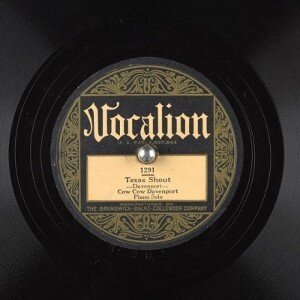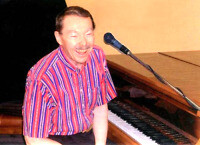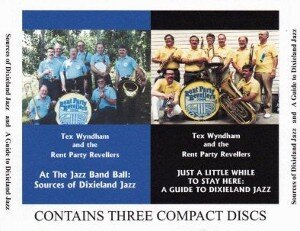The following introduction was added when the Shouts were reprinted in the late 90s: Set forth below is the initial “Texas Shout” column, reprinted from the November-December 1989 issue of The American Rag(then West Coast Rag). Although the scene described therein has changed considerably in the past decade, I think this column is still a good place to start the reprint series because it deals with terminology, a subject that proved to be a frequent theme of “Texas Shout” through its lifetime.
Because the text has not been updated, I should point out that the “Sacramento Dixieland Jubilee” now calls itself the “Sacramento Jazz Jubilee” — not out of any aversion to the term “Dixieland”, but because the Jubilee currently presents such a broad range of jazz and jazz-related music that it can no longer properly be described as concentrating on any one of them. The same is true of Shasta and other festivals which used to include “Dixieland” in their names.
“Dixieland”
Not so long ago I undertook an assignment to write some liner notes. Everyone seemed happy with the result, except that both the producer and the artist took issue with my use of the term “Dixieland” to describe the music with which they were involved.
I asked each to define for me what he thought “Dixieland” was. I got two very different answers, one of which went into such things as the clothes worn by the musicians on stage.
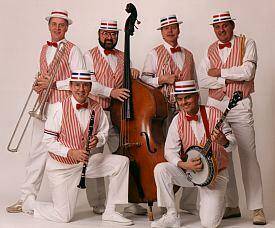
This incident caused me to reflect on the way, over the years, the term “Dixieland”, when used by people who have a deep commitment to the music normally covered by West Coast Rag, has become a pejorative word. Interestingly enough, these people rarely go much beyond that point in refining their thinking about “Dixieland”. It’s as if they are saying: “I recognize that music which is heavily informed by devices used by jazzmen during the twenties may be categorized into several styles. I know which of these styles I enjoy. The other styles are ‘Dixieland’.”
Thus, I have Person No. 1 telling me that “Dixieland” is “solo-oriented” twenties-style jazz, meaning (in this person’s case) what we generally refer to as Chicago style, a type which this person doesn’t like much (he prefers an emphasis on ensemble playing with carefully-worked-out routines on little-known titles). However, some well-known Chicagoans are reputed to have expressed a dislike of “Dixieland” and a preference to avoid playing with “Dixieland” musicians (meaning exactly those (usually) part-time organized bands preferred by Person No. 1). Obviously, both can’t be right.
The short answer is that none of these attitudes, though quite prevalent among the cognoscenti, makes musical sense. If “Dixieland” refers to a style of music, then there must be a musical definition of it — that is, we should be able to tell if a band is a “Dixieland” band just from hearing it, without needing to see what it’s wearing, how it moves on stage, etc. Also, if “Dixieland” refers to a style of music, then there must be varying levels of performance of it, from excellent to inferior — that is, there must be good Dixieland as well as bad Dixieland.
Yet, those who resist use of the term “Dixieland” usually do so because, whatever it is, they want to dismiss all of it. At any rate, I have never heard such a person admit that there is a Dixieland performance that he really enjoys.
I submit that denigration of the term “Dixieland” reflects sloppy thinking on the part of the folks who desire to do so. Worse, it is counterproductive to the effort in which we are all engaged to attract more people to an enjoyment of our music.
We should recognize that there is no need for us to preach to the converted. Instead, we should want to present ourselves, via our music, our terminology, etc., so that we can most easily reach the ones who have not yet come to appreciate the merits of twenties-style jazz.
:format(jpeg):mode_rgb():quality(90)/discogs-images/R-3242788-1516544447-6629.jpeg.jpg) If so, let’s face up to the fact that the most commonly understood term for our music, to those outside the field, is “Dixieland”. How many times have you had to explain to someone what “classic jazz” is? (“No sir, it has nothing to do with classical music.”) Or “traditional jazz”? (After all, bop has been around for nearly 50 years, and I have met bop musicians who consider themselves to be playing “traditional jazz”.) If someone not close to twenties-style jazz is going to associate any term with it at all, I think you’ll find overwhelmingly that the term which makes that association for them is “Dixieland”.
If so, let’s face up to the fact that the most commonly understood term for our music, to those outside the field, is “Dixieland”. How many times have you had to explain to someone what “classic jazz” is? (“No sir, it has nothing to do with classical music.”) Or “traditional jazz”? (After all, bop has been around for nearly 50 years, and I have met bop musicians who consider themselves to be playing “traditional jazz”.) If someone not close to twenties-style jazz is going to associate any term with it at all, I think you’ll find overwhelmingly that the term which makes that association for them is “Dixieland”.
Moreover, to the civilians outside our hallowed halls, “Dixieland” does not have the negative connotation described above. They may not know exactly what Dixieland is, or to be able to define it with precision, but they usually have an upbeat image of it, an image that suggests a good time.
Producers of large festivals have frequently been quick to perceive the positive effects of “Dixieland” on general audiences. The largest, best-attended festival in the world calls itself the “Sacramento Dixieland Jubilee”.
I’m sure all of us can name many other festivals which go out of their way to make sure that the public knows that they are a “Dixieland” or “Dixie” festival (San Diego, Central Ohio, Shasta, Santa Rosa, etc.). The producers of these festivals know that they need the attendance, not only of the small number of traveling jazz fans and jazz club members who read the genre publications, but also of the public as a whole.
I think it is time for our community to stop trashing a term that works on our behalf. This word helps us get gigs and helps us get audiences into those gigs where we then have the opportunity to expose them to quality older-style music. In short, “Dixieland” is not a synonym for bad jazz. It is a very useful umbrella term for describing the type of music played at our favorite festivals, music which is comprised of several styles, all of which can be played badly or well.
(As an aside, I can’t help but be amused at the inconsistency displayed by certain fans and musicians who claim to hate “Dixieland” but who nevertheless take great pains to plan trips to attend — or get invitations to perform at — festivals that proclaim themselves to be “Dixieland” festivals that hire “Dixieland” musicians. Do such musicians make a point of telling the festival chairman, when the invitation comes in, that they really shouldn’t be invited because they don’t play “Dixieland”, or do they take the gig under false pretenses?)
For my own part, my Red Lion Jazz Band’s business card states that we play “Authentic Dixieland”. When people ask me what kind of jazz I play, I respond “Dixieland”; that answer usually strikes sparks of recognition, and of a positive type.
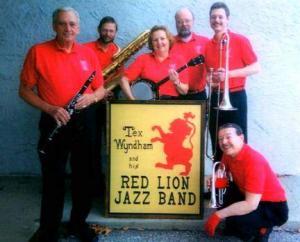 In the quarter-century the Red Lions have been together, we’ve never once, to my knowledge, lost a booking because the person who got my name decided he wanted a “classic jazz” or “traditional jazz” band and not a “Dixieland” band. Quite the contrary: I always point out to any potential client who’s never heard the RLJB that we are a Dixieland band, and he often responds with a sigh of relief and says that’s just what he wants.
In the quarter-century the Red Lions have been together, we’ve never once, to my knowledge, lost a booking because the person who got my name decided he wanted a “classic jazz” or “traditional jazz” band and not a “Dixieland” band. Quite the contrary: I always point out to any potential client who’s never heard the RLJB that we are a Dixieland band, and he often responds with a sigh of relief and says that’s just what he wants.
We then go and play our regular show in which we perform as honestly, sincerely and uncompromisingly as we know how to do. Most of the time, both the crowd and the musicians leave with smiles of satisfaction on their faces.
Do yourself and the whole genre a favor. The next time you’re discussing jazz, don’t twist yourself into a pretzel trying to deny that you’re involved with “Dixieland” and trying to persuade others that they should investigate what they may perceive as an esoteric music described by a term they don’t know. Tell them up front that you like “Dixieland” (adding any other descriptive words, such as Chicago or uptown New Orleans, as you wish), and see if you don’t find yourself reaching a common understanding with them a lot faster than before.
Back to the Texas Shout Index.
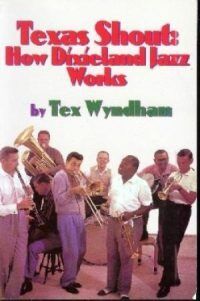
The full run of “Texas Shout” has been collected into a lavishly illustrated trade paperback entitled Texas Shout: How Dixieland Jazz Works. This book is available @ $20.00 plus $2.95 shipping from Tex Wyndham, On request, Tex will autograph the book and add a personalized note (be sure to tell him to whom the note should be addressed).
Tex Wyndham’s 3 CD Guide to Dixieland with music and commentary is available for $20 plus $2.95 shipping. The separate CD, A History of Ragtime: Tex Wyndham Live At Santa Rosa, is available for $13.00 plus $2.00 shipping. On request, Tex will autograph the inner sleeve and add a personalized note (be sure to tell him to whom the note should be addressed).
Send payment to Tex Wyndham, P.O. Box 831, Mendenhall, PA 19357, Phone (610) 388-6330.
Note: All links, pictures, videos or graphics accompanying the Shouts were added at the discretion of the Syncopated Times editorial staff. They did not accompany the original columns and do not necessarily reflect the opinion of Tex Wyndham.
From roughly 1970-2010, Tex Wyndham was: (1) one of the best-known revivalist Dixieland jazz musicians in the US, as cornetist, pianist and bandleader, (2) one of the best-known ragtime pianists in the US, and (3) one of the most respected critics in the US of Dixieland jazz, ragtime, and related music. He is the only person about whom all three of those statements can be made.

